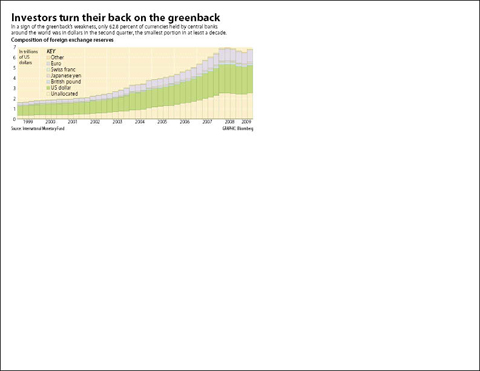The US dollar fell for the first time in three weeks against the euro as calls for a “strong” US currency failed to reassure investors concerned the government and Federal Reserve will accept declines in the greenback.
Traders shifted funds to the Australian dollar, making it the best performer this week among 16 major currencies.
The US dollar fell 1.1 percent to US$1.4732 per euro on Friday in New York, from US$1.4576 last Friday, in the first weekly decline since its 1 percent slide in the five days ended Sept. 18. The US currency was little changed at ¥89.78, compared with ¥89.81, before the Bank of Japan’s meeting next week. The euro climbed 1 percent to ¥132.25.

The Australian dollar rose 4.4 percent to US$0.9036 in the biggest weekly gain since May after the Reserve Bank unexpectedly raised the overnight cash target by a quarter-percentage point to 3.25 percent on Tuesday.
Sterling was the only loser versus the dollar this week among the 16 most-traded currencies. It fell 0.7 percent to US$1.5842 in a fourth weekly drop on speculation the economy remains too weak for the Bank of England to consider raising borrowing costs and stop asset purchases.
India’s rupee led weekly gains in Asian currencies as signs the region is recovering from a global recession attracted investment, overwhelming attempts by central banks to stem appreciation.
The New Taiwan dollar fell for a second day on Friday to NT$32.24 against its US counterpart, according to Taipei Forex Inc. The NT dollar reached NT$31.995 last Thursday, the strongest level since the same date last year.
The NT dollar has gained 1.6 percent in the past month against the greenback as overseas funds bought US$3.4 billion more Taiwanese shares than they sold.
The rupee jumped 2.7 percent this week to 46.475, according to data compiled by Bloomberg. Malaysia’s ringgit rose 2.4 percent to 3.3981, Indonesia’s rupiah climbed 2 percent to 9,455 and South Korea’s won rose 0.9 percent to 1,164.38.
The Philippine peso climbed 1.4 percent this week to 46.46. The Singapore dollar climbed 1.7 percent to close at a 14-month high of S$1.3928.

RESILIENCE: Deepening bilateral cooperation would extend the peace sustained over the 45 years since the Taiwan Relations Act, Greene said Taiwan-US relations are built on deep economic ties and shared values, American Institute in Taiwan (AIT) Director Raymond Greene said yesterday, adding that strengthening supply chain security in critical industries, enhancing societal resilience through cooperation and deepening partnerships are key to ensuring peace and stability for Taiwan in the years ahead. Greene made the remarks at the National Security Youth Forum, organized by National Taiwan University’s National Security and Strategy Studies Institution in Taipei. In his address in Mandarin Chinese, Greene said the Taiwan-US relationship is built on deep economic ties and shared interests, and grows stronger through the enduring friendship between

GAINING STEAM: The scheme initially failed to gather much attention, with only 188 cards issued in its first year, but gained popularity amid the COVID-19 pandemic Applications for the Employment Gold Card have increased in the past few years, with the card having been issued to a total of 13,191 people from 101 countries since its introduction in 2018, the National Development Council (NDC) said yesterday. Those who have received the card have included celebrities, such as former NBA star Dwight Howard and Australian-South Korean cheerleader Dahye Lee, the NDC said. The four-in-one Employment Gold Card combines a work permit, resident visa, Alien Resident Certificate (ARC) and re-entry permit. It was first introduced in February 2018 through the Act Governing Recruitment and Employment of Foreign Professionals (外國專業人才延攬及雇用法),

The Ministry of Transportation and Communications yesterday said that it would redesign the written portion of the driver’s license exam to make it more rigorous. “We hope that the exam can assess drivers’ understanding of traffic rules, particularly those who take the driver’s license test for the first time. In the past, drivers only needed to cram a book of test questions to pass the written exam,” Minister of Transportation and Communications Chen Shih-kai (陳世凱) told a news conference at the Taoyuan Motor Vehicle Office. “In the future, they would not be able to pass the test unless they study traffic regulations

‘COMING MENACINGLY’: The CDC advised wearing a mask when visiting hospitals or long-term care centers, on public transportation and in crowded indoor venues Hospital visits for COVID-19 last week increased by 113 percent to 41,402, the Centers for Disease Control (CDC) said yesterday, as it encouraged people to wear a mask in three public settings to prevent infection. CDC Epidemic Intelligence Center Deputy Director Lee Chia-lin (李佳琳) said weekly hospital visits for COVID-19 have been increasing for seven consecutive weeks, and 102 severe COVID-19 cases and 19 deaths were confirmed last week, both the highest weekly numbers this year. CDC physician Lee Tsung-han (李宗翰) said the youngest person hospitalized due to the disease this year was reported last week, a one-month-old baby, who does not